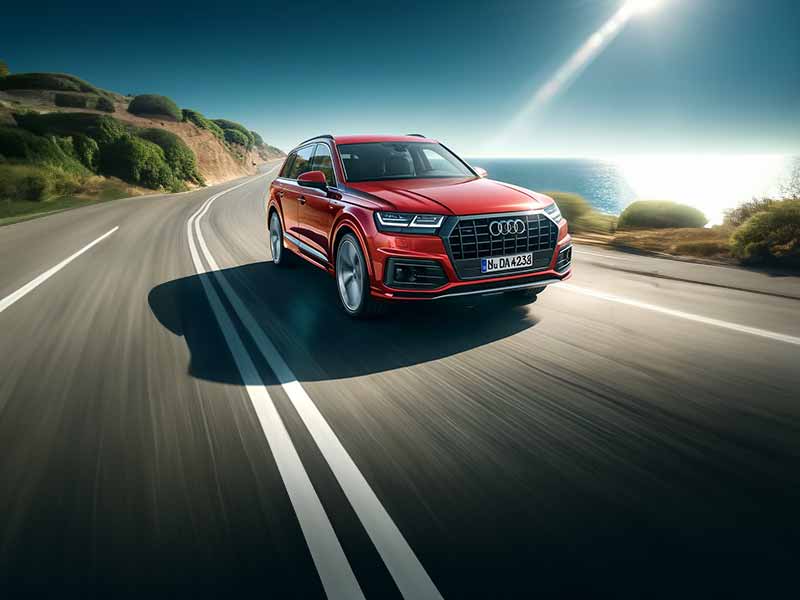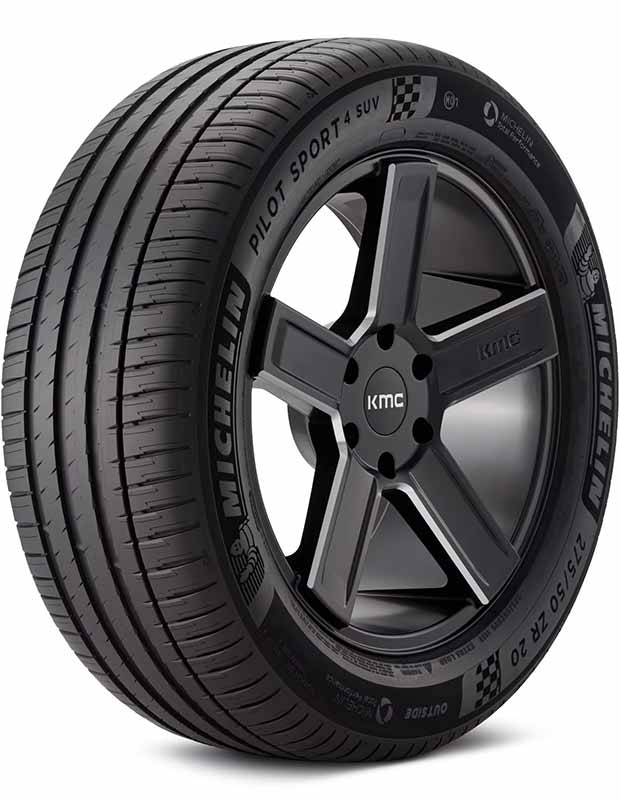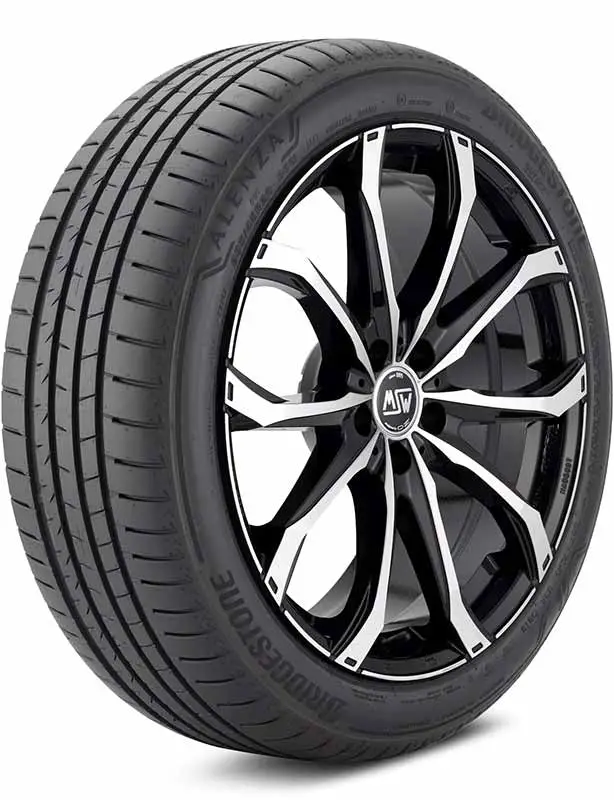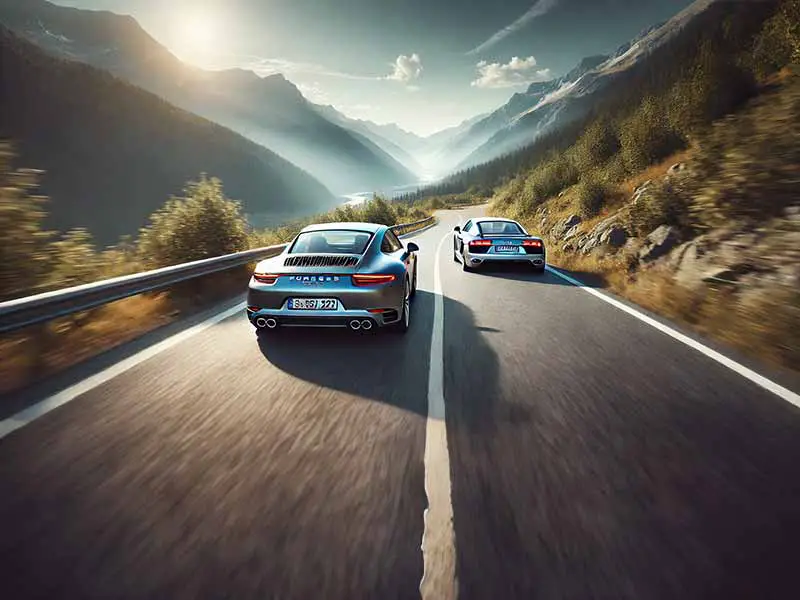You’re eyeing the Michelin Pilot Sport 4 SUV and Bridgestone Alenza 001, but there’s a catch: they’re not just different brands, they have unique strengths. Which one will ensure your ride is safe, comfortable, and optimized for your driving conditions?
The Michelin Pilot Sport 4 SUV excels in both wet and dry conditions with superior handling and comfort, making it ideal for performance-focused drivers. The Bridgestone Alenza 001, while offering good all-around performance, may require more frequent replacements and performs slightly less in wet conditions.
In this article, we delve into a detailed comparison of the Michelin Pilot Sport 4 SUV and Bridgestone Alenza 001, assess their performance across various conditions, and explore alternative options in the summer tire market.
Michelin Pilot Sport 4 SUV
Customer Rating
Overall Rating
8.7 of 10
Wet Weather
8.9 of 10
Winter Weather
N/A
Tread Wear
7.7 of 10
Dry Weather
9.3 of 10
Ride Comfort
8.9 of 10
UTQG
Uniform Tire Quality Grade
UTQG Treadwear Rating: 220
UTQG Traction Rating: A
UTQG Temperature Rating: A
Mileage Warranty
6 Years / 20,000 Miles
Find The Best Price
Key Performance Metrics
Hydroplaning: 8.8 of 10
Wet Grip: 8.9 of 10
Cornering: 9.3 of 10
Dry Grip: 9.4 of 10
Responsiveness: 9.3 of 10
Mild Snow Grip: N/A
Heavy Snow Grip: N/A
Ice Grip: N/A
Comfort Level: 9.1 of 10
Road Noise: 8.8 of 10
Let’s dive into what makes the Michelin Pilot Sport 4 SUV a contender you might want to consider for your SUV.
Performance Metrics Explained
- Wet Performance (8.9/10): This score tells you that the Michelin Pilot Sport 4 SUV grips the road well even when it’s raining cats and dogs. The hydroplaning resistance score of 8.8 means less worry about losing control in wet conditions.
- Dry Performance (9.3/10): With stellar scores in corner stability and dry traction, these tires promise sharp turns and strong grips during those dry summer days. The steering response rating echoes this, ensuring your vehicle feels responsive and secure.
- Comfort (8.9/10): A ride quality score of 9.1 combined with a noise level at 8.8 suggests these tires offer a smooth and fairly quiet ride, making your journey as comfortable as a Sunday morning.
- Treadwear (7.7/10): While not the highest score, it’s a fair indicator that you’ll get a decent mileage out of these tires before needing a replacement.
Pros
- Excellent grip in both wet and dry conditions.
- High comfort levels enhance the driving experience.
- Strong performance in handling and steering responsiveness.
Cons
- Treadwear could be better; there are tires in the market that promise longer life.
Bridgestone Alenza 001
Customer Rating
Overall Rating
8.3 of 10
Wet Weather
8.3 of 10
Winter Weather
N/A
Tread Wear
7.5 of 10
Dry Weather
8.9 of 10
Ride Comfort
8.5 of 10
UTQG
Uniform Tire Quality Grade
UTQG Treadwear Rating: 300
UTQG Traction Rating: A
UTQG Temperature Rating: A
Mileage Warranty
None
Find The Best Price
Key Performance Metrics
Hydroplaning: 8.3 of 10
Wet Grip: 8.3 of 10
Cornering: 8.9 of 10
Dry Grip: 9.0 of 10
Responsiveness: 8.9 of 10
Mild Snow Grip: N/A
Heavy Snow Grip: N/A
Ice Grip: N/A
Comfort Level: 8.5 of 10
Road Noise: 8.4 of 10
The Bridgestone Alenza 001 offers a unique blend of features that might just be what you need. Let’s break down its performance and see how it stands up to the demands of both wet and dry conditions, as well as its comfort and durability.
Performance Metrics Explained
- Wet Performance (8.3/10): The Alenza 001 scores consistently in hydroplaning resistance and wet traction, each marked at 8.3. This indicates reliable performance in rainy conditions, providing a steady grip and reducing the risk of water-related slips.
- Dry Performance (8.9/10): In dry conditions, this tire shines with excellent corner stability and a dry traction score of 9.0. It ensures that handling remains precise and responsive, ideal for those dry, twisting roads.
- Comfort (8.5/10): With a solid ride quality and noise level score, the Alenza 001 ensures a comfortable driving experience that doesn’t sacrifice the peace inside your cabin for performance.
- Treadwear (7.5/10): The tread life of the Alenza 001 is somewhat modest. It’s designed for performance but might fall short for those seeking longevity above all else.
Pros
- Good all-round performance in wet and dry conditions.
- Strong cornering stability enhances driver confidence.
- Comfortable ride quality with controlled noise levels.
Cons
- Treadwear might be a concern for drivers looking for a longer-lasting tire.
- Slightly lower wet performance ratings compared to some competitors, which could be a deciding factor for those in rainier climates.
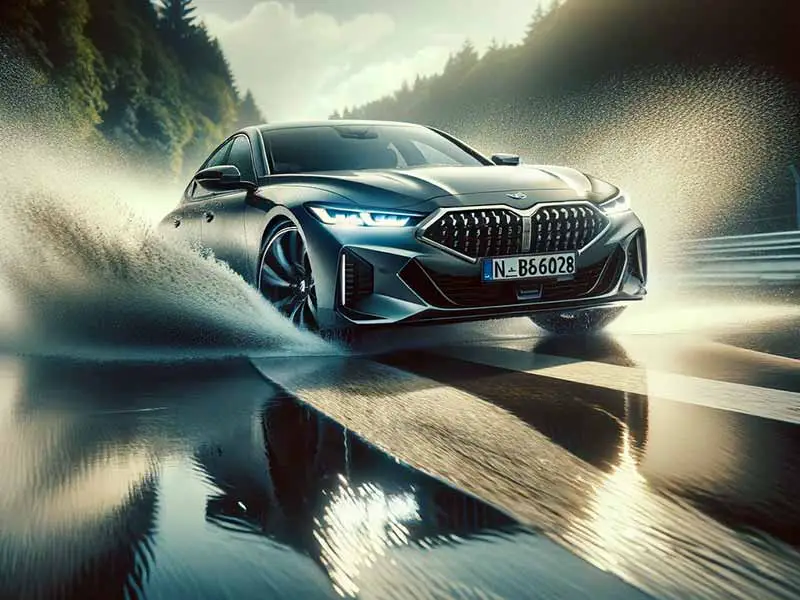
Comparative Analysis
When deciding between two top-tier tires like the Michelin Pilot Sport 4 SUV and the Bridgestone Alenza 001, it’s crucial to understand how they stack up against each other in key performance areas.
| Feature | Michelin Pilot Sport 4 SUV | Bridgestone Alenza 001 |
|---|---|---|
| Wet Performance | ||
| Hydroplaning Resistance | 8.8 | 8.3 |
| Wet Traction | 8.9 | 8.3 |
| Dry Performance | ||
| Corner Stability | 9.3 | 8.9 |
| Dry Traction | 9.4 | 9.0 |
| Steering Response | 9.3 | 8.9 |
| Comfort | ||
| Ride Quality | 9.1 | 8.5 |
| Noise | 8.8 | 8.4 |
| Treadwear | 7.7 | 7.5 |
Wet Performance
- Michelin Pilot Sport 4 SUV: Scores an 8.9 with hydroplaning resistance at 8.8 and wet traction at 8.9. This tire offers superior wet handling, providing confidence during rainy drives.
- Bridgestone Alenza 001: With a uniform score of 8.3 for hydroplaning resistance and wet traction, the Alenza 001 performs commendably but falls slightly behind the Michelin in terms of wet surface grip.
Dry Performance
- Michelin Pilot Sport 4 SUV: Outstanding with a score of 9.3. It excels in corner stability, dry traction, and steering response, making it ideal for drivers who enjoy spirited driving in dry conditions.
- Bridgestone Alenza 001: Also performs well with an 8.9 overall in dry conditions. It provides excellent corner stability and dry traction but doesn’t quite reach the responsiveness and grip of the Michelin.
Comfort
- Michelin Pilot Sport 4 SUV: With a ride quality score of 9.1 and noise level at 8.8, this tire is among the top for ensuring a comfortable and quiet ride.
- Bridgestone Alenza 001: Very close, with a comfort score of 8.5, balancing ride quality and noise at a slightly lower level than the Michelin, but still ensuring a pleasant driving experience.
Treadwear
- Michelin Pilot Sport 4 SUV: Scored 7.7, indicating good but not great longevity. This might be a trade-off for its superior performance features.
- Bridgestone Alenza 001: Slightly lower at 7.5, indicating a need for potentially more frequent replacements depending on driving habits and conditions.
Handling and Stability
Both tires offer exceptional handling and stability, but the Michelin edges out slightly in terms of steering response and dry cornering, which can be crucial for those who value precision driving dynamics.
Pros and Cons Recap
- Michelin Pilot Sport 4 SUV: Pros include top-notch wet and dry performance and high comfort levels; the main con is the lower treadwear score.
- Bridgestone Alenza 001: Pros are good performance in various conditions and comfort; cons include lower wet performance and treadwear.
If your priority is maximum performance in wet and dry conditions with a strong emphasis on comfort, and you don’t mind replacing tires a bit more frequently, the Michelin Pilot Sport 4 SUV might be the best pick. On the other hand, if you prefer a balanced tire with solid performance across the board and can accept slight compromises in wet handling and tread life, the Bridgestone Alenza 001 could be the right choice.
Other Competitors in the Market
While the Michelin Pilot Sport 4 SUV and Bridgestone Alenza 001 are standout choices for many drivers, the market offers a variety of other tires that might better suit different needs or preferences. Let’s take a closer look at some of the other competitive options in the summer performance tire category, highlighting their strengths and potential drawbacks.
General Grabber UHP
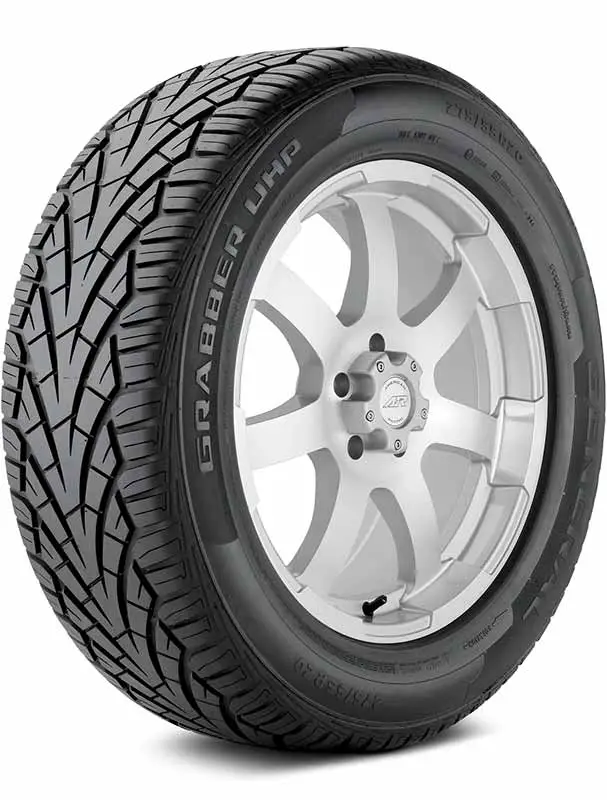
Performance Overview:
- Wet: Scored 8.7, showcasing good hydroplaning resistance and wet traction.
- Dry: Rated 8.8, with notable corner stability and dry traction, providing a confident driving experience.
- Comfort: Comfort score of 7.9, with ride quality slightly higher at 8.2, indicating a decent level of comfort but lower than some peers.
- Treadwear: Stands at 7.9, similar to our main contenders, suggesting reasonable durability.
Pros: Offers balanced performance in both wet and dry conditions. It’s a viable option for those looking for a reliable all-rounder.
Cons: The noise level and overall comfort are not as high as some competitors, which might be a drawback for those prioritizing a quieter ride.
Continental CrossContact UHP
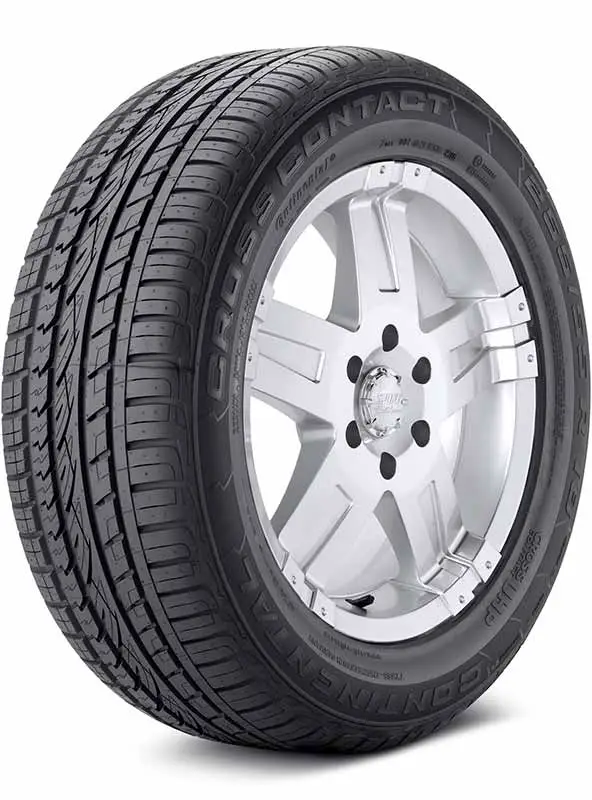
Performance Overview:
- Wet: Achieves an 8.2, with slightly lower hydroplaning resistance.
- Dry: A solid 8.7, with good dry traction and reasonable corner stability.
- Comfort: Scores 8.2 across the board for ride quality and noise, making it a comfortable choice, though not the top in its class.
- Treadwear: The lowest at 6.6, indicating that while performance is robust, longevity may be a concern.
Pros: Good performance in dry conditions and a comfortable ride.
Cons: Lower wet performance and significant concerns about tread life, which could lead to more frequent tire replacements.
Goodyear Eagle F1 Asymmetric SUV
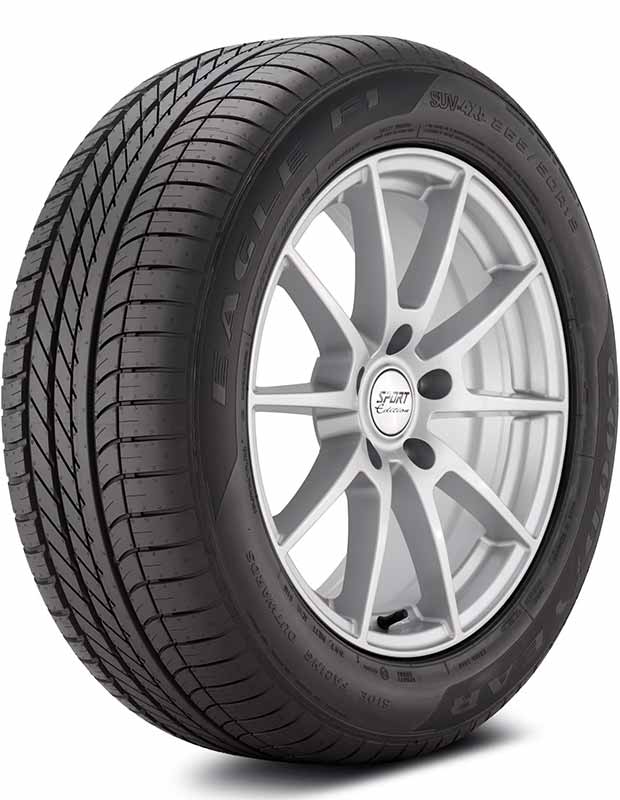
Performance Overview:
- Wet: Rated 7.3, with the lowest hydroplaning resistance in this group at 7.1 and wet traction at 7.6.
- Dry: Scores 8.1, respectable for dry traction and corner stability.
- Comfort: Has a comfort score of 7.3, the lowest among the competitors, with ride quality at 7.5 and noise level at 7.1.
- Treadwear: Also the lowest at 5.0, suggesting the shortest lifespan among the options discussed.
Pros: Adequate performance in dry conditions; may offer competitive pricing.
Cons: Falls short in wet performance, comfort, and treadwear, making it less ideal for those looking for long-term value or frequent wet conditions.
Each of these competitors brings something different to the table. While none may entirely match the Michelin or Bridgestone in every aspect, they offer viable alternatives that might appeal to different budgets, performance expectations, or specific needs. Understanding the strengths and limitations of each can help you make a more tailored choice that aligns with your particular driving conditions and priorities.
Resources
Below are some links you may find helpful when learning about tires:
- Michelin Product Page
- Bridgestone Product Page
- Street/sport truck summer performance tire consumer ratings – Tire Rack
Final Thoughts
Choosing between the Michelin Pilot Sport 4 SUV and Bridgestone Alenza 001 depends largely on your driving demands and conditions. The Michelin is unmatched in handling and comfort, particularly suited for those who demand peak performance in both wet and dry conditions.
On the other hand, the Bridgestone is a robust all-rounder that offers a comfortable ride but may fall short in longevity and wet performance compared to the Michelin. Evaluate what you value most in your tire choices—be it durability, performance, or comfort—to make the best decision for your SUV.
Good luck and happy motoring.
